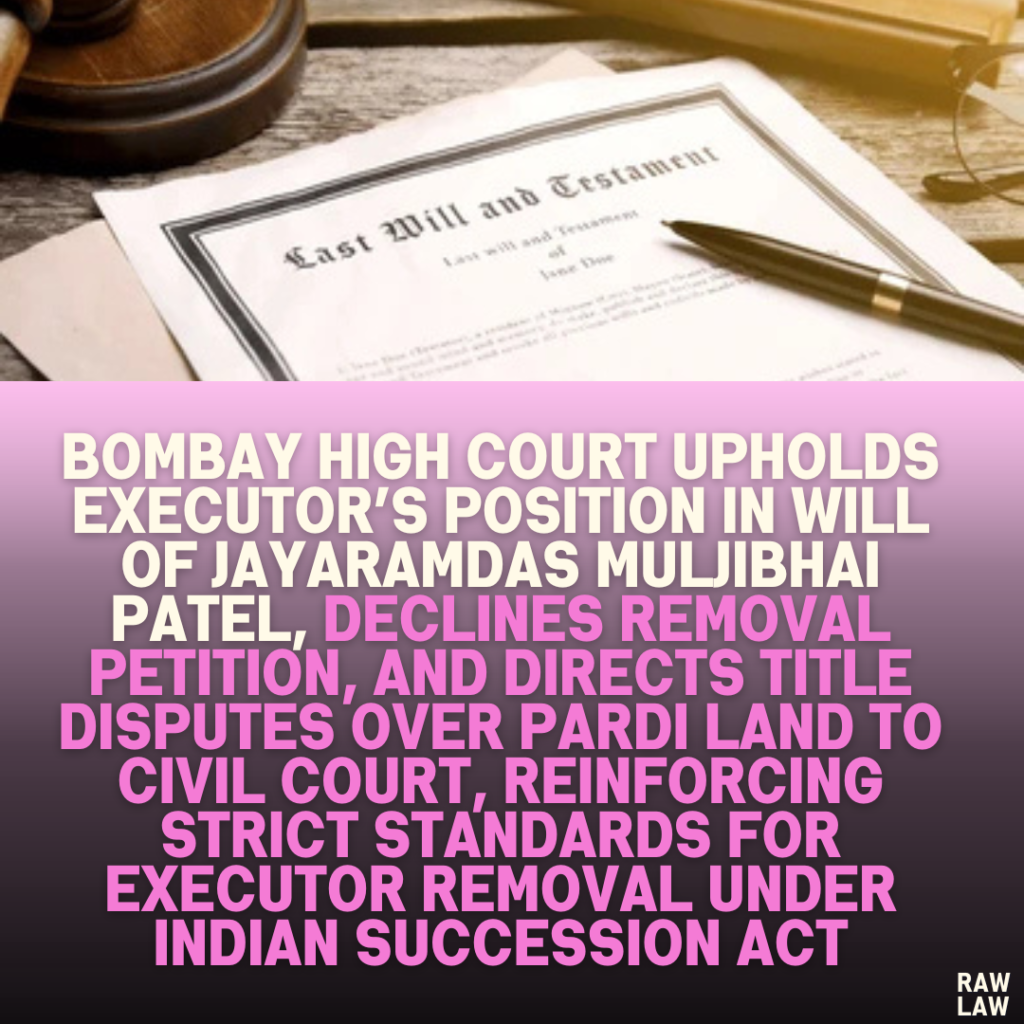Court’s Decision
The Bombay High Court dismissed the application seeking the removal of the petitioner from the position of executor of the Will of Jayaramdas Muljibhai Patel. The Court concluded that the executor’s actions, though contentious, did not meet the threshold of gross misconduct or adverse title assertions necessary for removal under Section 301 of the Indian Succession Act, 1925. It clarified that disputes regarding the Pardi land should be resolved in the Civil Court, where the matter is already sub judice.
Facts of the Case
- Will and Executors: The testator, Jayaramdas Muljibhai Patel, executed a Will dated October 4, 2008, appointing his son (the petitioner) and daughter as executors. The testator passed away in 2010, and his daughter (a co-executor) passed away in 2021, leaving the petitioner as the sole executor.
- Estate Distribution: The Will contained detailed bequests of the testator’s properties and assets, including:
- Specific partnership interests to the petitioner.
- Residual estate, including shares in VFC Industries Pvt. Ltd., to the applicant (grandson).
- Contention over Pardi Land:
- The Pardi land was not explicitly mentioned in the Will.
- The applicant alleged that the land, forming part of the residual estate, was misappropriated by the executor.
- The executor claimed that the Pardi land was brought into the stock of a partnership firm (M/s. Vijay Farms) during the testator’s lifetime and did not belong to the estate.
- Applicant’s Allegations:
- Suppression of the Will before revenue authorities.
- Failure to disclose the Pardi land in the probate application.
- Setting up an adverse title over the Pardi land.
- Executor’s Defense:
- The Pardi land was part of a partnership firm’s assets, not the residual estate.
- Any discrepancies arose due to legal impediments, not misconduct.
- The estate was fully distributed in 2014, and the application was filed belatedly.
Issues
- Did the Pardi land form part of the residual estate under the Will?
- Did the executor act against the testator’s intent, justifying removal?
- Was the executor’s conduct detrimental to the estate or beneficiaries?
Petitioner’s (Executor’s) Arguments
- Nature of the Pardi Land: The executor argued that the Pardi land was introduced as part of a partnership firm, M/s. Vijay Farms, by the testator. The partnership firm owned the land, not the testator’s estate.
- Executor’s Conduct: The executor maintained that the estate was administered in accordance with the Will and completed in 2014, except for disputes over the Pardi land.
- Jurisdiction: The executor emphasized that testamentary courts could not decide on title disputes, which were already pending before a Civil Court.
- Delay in Filing: The applicant’s inaction for years undermined the application’s credibility.
Respondent’s (Applicant’s) Arguments
- Adverse Claims: The applicant contended that the executor acted against the testator’s intent by claiming adverse title over the Pardi land, violating fiduciary duties.
- Breach of Duty: The executor failed to disclose the Pardi land in probate applications and acted to his benefit, contravening the Will.
- Gross Misconduct: The executor’s suppression of the Will before revenue authorities and misrepresentation constituted gross misconduct warranting removal.
Analysis of the Law
- Section 301 of the Indian Succession Act:
- Allows removal of an executor for gross misconduct, mismanagement, or adverse claims against the estate.
- Courts are cautious, as the executor reflects the testator’s confidence.
- Precedents Referenced:
- Mukesh Gokul Case: Executors cannot act against beneficiaries or assert adverse claims.
- Tara Chand Sharma Case: Executors abusing their position to divert property should be removed.
- Abha Dastane Case: Removal requires strong evidence of detrimental actions, not minor lapses.
- Executor’s Duties:
- Executors must act in the estate’s and beneficiaries’ interest.
- Conflicts of interest or adverse claims undermine their fiduciary role.
Precedent Analysis
- Conflict of Interest: Courts have consistently held that executors setting up adverse claims against the estate must step down.
- Protection of Beneficiaries: Removal is justified where executor actions harm beneficiaries or estate integrity.
Court’s Reasoning
- Pardi Land’s Status:
- The Court noted the absence of clear evidence that the Pardi land formed part of the residual estate.
- Disputes over its ownership and treatment during the testator’s lifetime (as part of a partnership firm) made it a question of title.
- Executor’s Actions:
- While the executor’s actions raised concerns, they did not amount to gross misconduct or adverse claims.
- The Court emphasized that disputes over the Pardi land should be adjudicated in the Civil Court.
- Continuity of Executor:
- The estate’s administration was largely complete, barring the Pardi land issue.
- The executor’s continuation did not harm the estate or beneficiaries.
Conclusion
The Court dismissed the application for removal, stating:
- The executor’s actions, though contentious, did not meet the threshold for removal.
- The Pardi land dispute, central to the controversy, fell within the Civil Court’s jurisdiction.
- Observations were limited to the removal application and not the merits of pending probate or title disputes.
Implications
- Title vs. Testamentary Jurisdiction: The judgment clarifies that testamentary courts do not resolve title disputes.
- Executor’s Role: Executors must avoid conflicting claims and act in beneficiaries’ interest to retain their position.
- Civil Court’s Role: Title disputes must be adjudicated separately, even when linked to testamentary matters.
This decision emphasizes the cautious approach courts take in removing executors, balancing the testator’s confidence against beneficiaries’ welfare.




Pingback: Gauhati High Court Rules Injunction Against Sale of Land Unjustified Without Challenge to Sale Deeds but Upholds Status Quo on Possession to Prevent Further Disputes - Raw Law